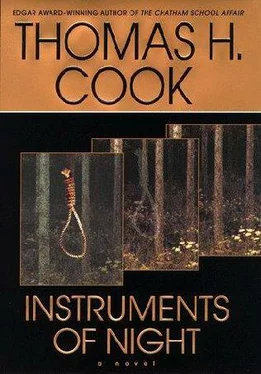Thomas Cook - Instruments of Night
Здесь есть возможность читать онлайн «Thomas Cook - Instruments of Night» весь текст электронной книги совершенно бесплатно (целиком полную версию без сокращений). В некоторых случаях можно слушать аудио, скачать через торрент в формате fb2 и присутствует краткое содержание. Жанр: Триллер, на английском языке. Описание произведения, (предисловие) а так же отзывы посетителей доступны на портале библиотеки ЛибКат.
- Название:Instruments of Night
- Автор:
- Жанр:
- Год:неизвестен
- ISBN:нет данных
- Рейтинг книги:3 / 5. Голосов: 1
-
Избранное:Добавить в избранное
- Отзывы:
-
Ваша оценка:
- 60
- 1
- 2
- 3
- 4
- 5
Instruments of Night: краткое содержание, описание и аннотация
Предлагаем к чтению аннотацию, описание, краткое содержание или предисловие (зависит от того, что написал сам автор книги «Instruments of Night»). Если вы не нашли необходимую информацию о книге — напишите в комментариях, мы постараемся отыскать её.
Instruments of Night — читать онлайн бесплатно полную книгу (весь текст) целиком
Ниже представлен текст книги, разбитый по страницам. Система сохранения места последней прочитанной страницы, позволяет с удобством читать онлайн бесплатно книгу «Instruments of Night», без необходимости каждый раз заново искать на чём Вы остановились. Поставьте закладку, и сможете в любой момент перейти на страницу, на которой закончили чтение.
Интервал:
Закладка:
PORTMAN: Why did you think she’d run away?
GROSSMAN: Because she was… young. The young do strange things, no?
PORTMAN: Do you know of any reason why Faye would have wanted to run away?
GROSSMAN: No. No reason. Perhaps just to-Nothing. I do not know a reason.
PORTMAN: Do you know of any personal problems she might have had?
GROSSMAN: No. We talked sometimes. When I took photographs of her. But we did not speak of-what is the word?-of close things. Close to the heart. I did not know Faye. Only that she was… nice.
Now, having reached a dead end, Portman shifted the conversation in a different direction:
PORTMAN: Had you ever taken Faye to Manitou Cave before you took the photograph of her there?
GROSSMAN: No.
PORTMAN: Did you ever take her there again?
GROSSMAN: No. Never again. But perhaps she went there herself. She thought it was a beautiful place. That was her comment.
PORTMAN: Had she been there before?
GROSSMAN: I think so, yes. She seemed to… know it.
PORTMAN: Had she ever gone there alone?
Why had Portman asked if Faye had gone to Manitou Cave alone, Graves wondered. Had he suspected that on the day of her death she’d planned to meet someone at Manitou Cave?
But Portman did not pursue the matter further. Instead, he directed the interview away from Faye and back to Grossman’s life at Riverwood, how long he’d been there, when he planned to leave, but always circling back to his presence at Manitou Cave, his discovery there.
PORTMAN: You said you were planning to leave Riverwood soon?
GROSSMAN: Yes. I have no more work here. I must make other plans. It is not easy. That is why I was walking. To think about my plans.
PORTMAN: Well, exactly how did you happen to come across the body?
GROSSMAN: I stopped to rest. This is how I saw. I sat down on the ground. That is when I saw her. At first I saw only a girl in the leaves. I thought she was maybe sleeping. I started to leave. I did not wish to disturb her. But when I rose from the ground, I saw that she was… put there. It did not look like a person sleeping. It looked
… twisted.
PORTMAN: Where exactly were you sitting when you saw Faye?
To this question Grossman had given a highly detailed answer. He’d sat by a tree, he said, a large old tree with many exposed roots, perhaps a hundred yards from the river. There’d been a stump nearby. The stump had rested under a panoply of low-slung limbs, and he’d first thought of sitting on it. Then he’d noticed that it was old and decayed, one of its sides caved in slightly, bits of rotting wood scattered around it. And so, fearing it might not support him, he’d settled down next to it instead.
As to his whereabouts on the day of the murder, Grossman was emphatic:
GROSSMAN: I was here at Riverwood, as I have said many times. I was completing my portrait of Mrs. Davies. We were in the library.
PORTMAN: All day?
GROSSMAN: All day. Except for lunch. For lunch we went to the dining room, of course. After that we returned to the library. You may speak to Mrs. Davies. She will tell you the same.
Portman had already spoken to Mrs. Davies, of course. Knew well that she’d confirmed Grossman’s story. Graves felt it probable that Portman might also have suspected that the two were in league somehow, providing mutual alibis. But if that were true, the old detective’s notes did not suggest it. Instead, he seemed now to question the alibis of other people who’d been at Riverwood on the day of Faye’s death, abruptly shifting his inquiry toward them and away from Grossman, probing not whether Grossman himself had murdered Faye but whether he knew of someone else who had.
PORTMAN: Do you know if Faye had any close relationships with anybody at Riverwood? Anybody in the family or on the staff?
GROSSMAN: Faye was often with Allison.
PORTMAN: Anybody else?
GROSSMAN: On most occasions, no.
It was not an answer Portman accepted:
PORTMAN: How long have you lived here at Riverwood?
GROSSMAN: About four months.
PORTMAN: And in all that time you never saw Faye with anyone but Allison?
GROSSMAN: Occasionally I saw her with a young man. His name is Frank, I believe.
PORTMAN: You mean Frank Saunders, the kid who works at Riverwood?
GROSSMAN: Yes, that is the young man I mean. I have seen Frank with Faye from time to time. They are sometimes together.
In his mind Graves now saw Portman scribble a note into the little green book Graves’ own imagination provided, the words written in it the same ones he now wrote on the pad beside his desk: FS amp; FH seen “sometimes together” (Grossman).
PORTMAN: Did you get the idea that this was a romantic attachment-the one between Frank Saunders and Faye?
GROSSMAN: It is not clear to me, the nature of it. Perhaps the two are friends. Perhaps more than friends. I do not know.
PORTMAN: Well, can you think of anyone here at Riverwood who might have disliked Faye?
GROSSMAN: No. No one.
Portman had his doubts:
PORTMAN: You know, Mr. Grossman, from the way people here talk, you’d think Riverwood was heaven. Everybody loves everyone else. Everybody gets along. To tell you the truth, it’s a little hard to believe everything could be that smooth.
GROSSMAN: I do not know about everybody. I am soon to leave Riverwood. If there is trouble here, it is not my trouble.
With that, the interview had ended. The remainder of the page was blank save for a single observation scrawled at the bottom in Portman’s pinched script- Grossman on run. To which he’d appended a lingering question: Why?
Graves had just returned Portman’s notes to the envelope in which the old detective had placed them fifty years earlier when Saunders knocked and came into the room.
“Miss Davies asked me to give you this,” he said.
Graves took the small enamel box from Saunders’ hand. Its top and sides were adorned with brightly colored scenes of rural life. The women wore ornately designed dresses, their heads wrapped tightly in knotted scarves. The men wore baggy trousers, black vests, and billowy white shirts, and stood, swinging long scythes through yellow fields of grain.
“Pretty, isn’t it? Miss Davies said that those letters you wanted to see are inside it.” Saunders turned to leave.
“Did you know that Andre Grossman mentioned you?” Graves asked. “To Detective Portman.”
“Mentioned me?” For the first time Saunders’ buoyancy deserted him. “What did he say?”
“That he saw you and Faye together quite often. I hadn’t realized that you and she were close.”
“We weren’t. But Grossman probably did see Faye and me together. We liked each other. We talked. But I wouldn’t say that we were close.”
“You told me that everybody loved Faye. Other people have said the same thing. But no one has told me why.”
“Faye didn’t think of herself first. Always others. What they needed. What would be good for them.” Saunders looked at Graves knowingly. “You don’t believe me, do you? You don’t believe that anyone can really put another person first.”
Graves heard Kessler’s icy whisper, You knew she was here, but you took me to her anyway.
“I’m sorry you feel that way, Mr. Graves,” Saunders continued. “It must be hard, living with so little confidence in other people. Anyway, Faye was just like I described her. Maybe that’s why she was taken, because God loved her too much to keep her here on this earth.”
Graves said nothing. Such sentiments had no power to move or interest him. More important, Saunders’ comments seemed the product of a recent conversion, only a step away from some earlier darkness. “Did you always feel that way about Faye?”
Читать дальшеИнтервал:
Закладка:
Похожие книги на «Instruments of Night»
Представляем Вашему вниманию похожие книги на «Instruments of Night» списком для выбора. Мы отобрали схожую по названию и смыслу литературу в надежде предоставить читателям больше вариантов отыскать новые, интересные, ещё непрочитанные произведения.
Обсуждение, отзывы о книге «Instruments of Night» и просто собственные мнения читателей. Оставьте ваши комментарии, напишите, что Вы думаете о произведении, его смысле или главных героях. Укажите что конкретно понравилось, а что нет, и почему Вы так считаете.












